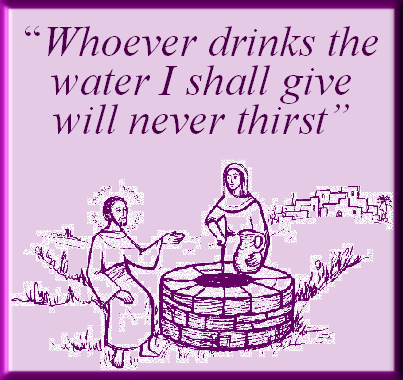Readings: Exodus 17:3-7; Romans 5:1-2,5-8; John 4:5-42
Theme: An Unforgettable Meeting at the Well
As a young lad, growing up on a small farm in the country before the advent of water on tap, one of my favourite chores was going to the well for water. My dad had dug and lined a well in the field below our house. Once a day, along with one of my brothers, or with my sister, I went to the well to ferry fresh water to the house. I enjoyed the challenge of lowering the bucket on a rope and pulling it up to the surface without spilling the water. Often, at the well, we would meet and chat with some of our neighbours who also came there to draw water. Today’s gospel reading from St John recounts the familiar story of Jesus’ meeting with a Samaritan woman at Jacob’s well in Sychar.
Some background will help us appreciate the significance of this intriguing story. Jesus and his disciples have left Jerusalem to return to the northern region of Galilee, where Jesus grew up and where he will carry out most of his ministry. Their journey takes them through Samaria whose inhabitants were a mixed-blood race due to centuries of intermarriage between Jews and Gentiles. Relationships between Jews and Samaritans were strained, to say the least – a bit like the relationship between Unionists and Catholics in Northern Ireland prior to the Good Friday Agreement. As we learn from John’s account, Jews and Samaritans did not worship God in the same place or associate with one another in any way.
The story begins with Jesus, a tired and thirsty traveller, resting himself by the well of Jacob during the hottest part of the day (‘the sixth hour’) while his disciples go off to the town to buy food. A Samaritan woman comes to the well to draw water and Jesus asks her for a drink. In response the woman expresses astonishment at his request: ‘What? You are a Jew and you ask me, a Samaritan, for a drink?’ (Jn 4:7). In asking her for a drink, Jesus is breaching the social and religious boundaries of his day on a number of counts. First, he is interacting alone with a woman. Secondly, she is a Samaritan woman, with whom he should not be conversing. Thirdly, according to Jewish law, accepting a drink from such a woman would entail ritual contamination for a law-abiding Jew. On their return from town, Jesus’ disciples are clearly shocked to find their master conversing with her (cf. Jn 4:27).
The woman’s surprised reaction gives Jesus the opportunity to shift the focus of the conversation from his thirst to her need and to move it to a deeper level. He tells her that if she knew who he is – which she clearly doesn’t – she would be the one asking him for ‘living water’ (cf. Jn 4: 10). She responds by asking how he can give her this water without a bucket. She even challenges him, saying: ‘Are you greater than our father Jacob, who gave us this well?’ (Jn 4:11). Patiently, Jesus points out that he is offering her something infinitely greater than physical water: ‘anyone who drinks the water that I shall give will never be thirsty again’ but will have ‘eternal life’ (Jn 4:14). Jesus is, of course, referring not to a physical thirst, but to a spiritual thirst, a thirst of the heart that people have experienced since the dawn of time. This is a thirst that only a life-giving relationship with God can satisfy. In the memorable words of St Augustine, ‘Our hearts are made for God, and they will not rest, until they rest in God’. It is and answer to this thirst Jesus is offering the Samaritan woman, though she does not yet realise it.
Eventually, as the conversation continues – ranging from the woman’s messy marriage situation to the different traditions of worship of Jews and Samaritans – the woman comes to recognise Jesus as a prophet. The conversation culminates with Jesus revealing himself to her as the Messiah. Finally, she has found the answer to a longing she didn’t realise she had until she met him. Leaving behind the water-jar, she rushes off joyfully to tell her town’s people about the man who has revealed her life to her. Abandoning her water jar is undoubtedly symbolic of the fact that she had indeed found in Jesus the source of ‘living water’. And with this discovery, a missionary is born. She cannot keep her experience to herself. She feels compelled to share it with others. As a result of her testimony, many Samaritans come to believe in Jesus. Many more come to believe in him when he stays in their town for two days, and they meet him themselves. Their direct experience of Jesus leads them to acknowledge him as ‘truly the Saviour of the World’ (Jn 4:42).
In an inspiring little book on John’s Gospel, entitled The Sign, scripture scholar, Sean Goan, highlights how this captivating story of Jesus’ meeting with the Samaritan woman can enrich our own faith-journey. He invites us to identify ourselves with the Smaritan woman and recognise ourselves in her,
‘because she names our thirst,
she embodies all the paths we go down looking for God,
she is humble enough to trust that God might be looking for her;
she is courageous enough to leave the jar behind.
Through her we understand that in God there are no outsiders;
we become grateful for the journey we have been on,
wherever it has taken us.
And that is a wonderful thing!’
Michael McCabe SMA
To listen to an alternative Homily for this Sunday, from Fr Tom Casey of the SMA Media Centre, Ndola, Zambia please click on the play button below.
|
|

